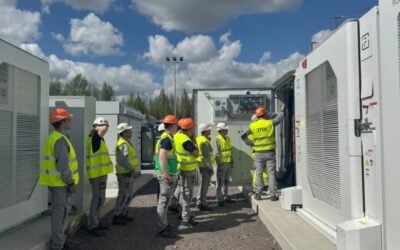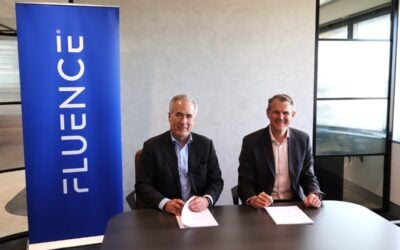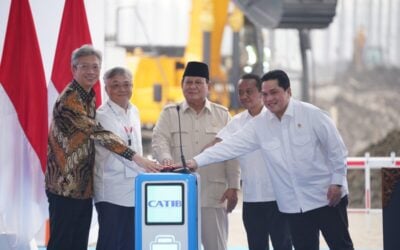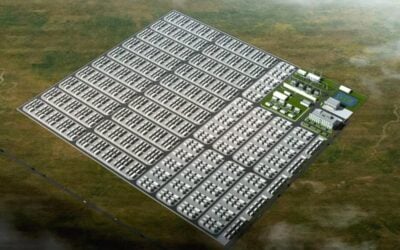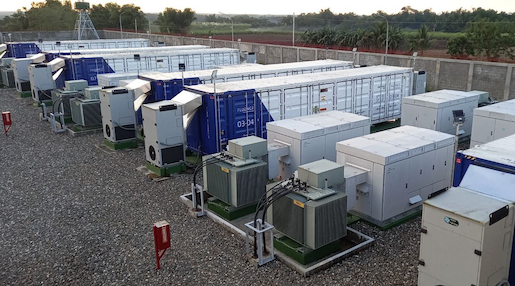
In the Philippines, Fluence has brought into commercial operation the first project in an order totalling nearly half a gigawatt, for vertically-integrated power company SMC Global Power Holdings (SMCGPH).
The publicly-listed energy storage technology company — which has also diversified into renewable energy trading and optimisation software and services — said today that the 20MW/20MWh battery energy storage system (BESS) has begun providing ancillary services for the grid.
Enjoy 12 months of exclusive analysis
- Regular insight and analysis of the industry’s biggest developments
- In-depth interviews with the industry’s leading figures
- Annual digital subscription to the PV Tech Power journal
- Discounts on Solar Media’s portfolio of events, in-person and virtual
Located in the city of Kabankalan in the Philippines’ Negros Occidental region, the BESS is the first of its kind in the entire country to be in the direct control of the National Grid Corporation of the Philippines. The grid operator will use the system for Automatic Generation Control (AGC), to provide ancillary services including frequency regulation, voltage control and reactive power management.
Fluence has received a total order for 470MW/470MWh of battery storage from SMC Global Power. Construction and commissioning on the 20MW project, along with another of the same size, was completed in June last year, as reported by Energy-Storage.news at the time with the Kabankalan battery system now the first to go into active service.
The energy storage company said work was completed on schedule despite challenging conditions created by the COVID-19 pandemic, from supply chain delays and travel restrictions to construction site protocols and health rules.
In common with some of Fluence’s other projects around the world since the pandemic was declared in early 2020 — as discussed with this site by Fluence chief operating officer John Zahurancik in an interview that year — the company put in additional safety protocols to protect workers such as social distancing and decontamination of equipment as it arrive on site.
Philippines taking proactive position in Southeast Asia
The Philippines, a nation comprising a series of islands of greatly varying size, population and population density, without a great deal of electricity grid interconnection between them. Combine those conditions with ageing grid infrastructure and the growing influx of renewables and the need — and opportunity — for energy storage in the country is thought to be acute.
The country’s Department of Energy (DoE) has been proactive in this respective, making efforts since 2019 to resolve questions around who should own energy storage as well as recognising the multi-faceted role batteries can play in the power sector.
SMC Global Power is thought to be building out a pipeline of 1,000MW in total in this current procurement. In addition to its contracts with Fluence, SMC Global Power has contracted with at least two other energy storage providers, ABB and Wärtsilä that have been publicly announced — albeit the deal with Fluence is thought to be the largest single grid battery project portfolio in the entire Southeast Asia region to date.
SMC Global Power leadership has previously said that while its battery systems will initially be deployed for ancillary services, the company is likely to look at ways to more directly integrate renewables in future.
In June last year, Wärtsilä’s director for the Australasia region told Energy-Storage.news that within a couple of years, the Philippines could be expected to become a “full-sized market” for energy storage. The country was “only getting started on this journey,” Kari Punnonen said as Wärtsilä completed construction of the first projects in its own 100MW/100MWh deal with SMC Global Power.
Another power generation company in the country, Aboitiz Power, said battery storage would be part of the foundation of its long-term growth as it committed to a moratorium on new coal projects last year. The first of Aboitiz’ BESS projects will be a novel 49’MW floating power barge’ which Wärtsilä is also working on.
Fluence noted that the Philippines power sector has taken note of batteries’ ability to respond to grid-balancing signals much quicker and much more cleanly than fossil fuel assets traditionally use for ancillary services. Assets like the Kabalankan BESS could also come into action to provide back up and resiliency to power supplies in the event of outages like the one experienced in the Philippines’ Cebu province last August.
“Each new battery asset we and SMCGPH bring online strengthens the Philippine grid, adding flexibility in the right places and with the right capabilities to support the nation’s energy transition,” Fluence’s Asia-Pacific president Jan Teichmann said.
The company expects the remainder of its portfolio for SMCGPH to be constructed by the end of July 2022 and begin commissioning and testing.
The BESS which has gone into service is actually Fluence’s second grid-connected battery project in the country, as well as being the second to connect to the national electricity network altogether: a 10MW/10MWh system was commissioned in 2016 at Masinloc power station, Zambales, by Fluence’s team when the company was still known as part of the AES Corporation.
Last year, the audience at the Solar & Storage Finance Asia event hosted by our publisher Solar Media heard about the challenges ahead for unlocking the market potential of energy storage in the Southeast Asia region.

